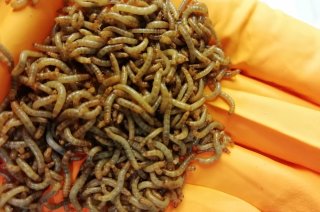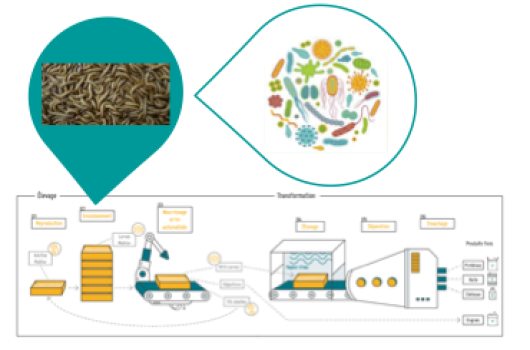
PhD project
Project 13 Food and probiotics in insect health and pathogen resistance (FR)
Diet composition is an important factor for insect development and the presence of probiotics in the microbial community present in the diet can protect different insects as bees and the yellow mealworm from pathogens. The role that probiotic bacteria and micronutrients play in enhancing insects’ fitness and immune responses in presence of pathogens infection needs more investigations.
The number of insect’s mass rearing systems is developing in EU due to the increasing demand of sustainable protein sources. Several insect species as grasshoppers, crickets, mealworms and flies, has already been used as feed and food sources in Asian, African and south American cultures. EU is modifying the legislation in order to authorize some insects’ species in the western market. Tenebrio molitor, common yellow mealworm, has just been approved for being used as food ingredient by EFSA (https://efsa.onlinelibrary.wiley.com/doi/epdf/10.2903/j.efsa.2021.6343).
This insect is the model used in my project.
If present, undetected pathogens can be devastating to rearing facilities and their insects, resulting in growing economic losses. Potentially, probiotics and prebiotic-like micronutrients of a diet could manipulate the gut microbial communities of reared insects. This means that feed composition and probiotics could assist in insect wellbeing and increased immune responses and may, in this instance, aid Tenebrio molitor against bacteria and fungi like Bacillus thuringiensis and Metarhizium brunneum. Another burning question is if these two pathogens together would result in a stronger disease, or if they would compete with each other, potentially limiting the symptoms that could occur due to a co-infection.
The results from this project will give information to improve diet and probiotics that can be applied at the beginning of the lifecycle of Tenebrio molitor in order to enhance the fitness and the basal immune responses. This condition should decrease the losses in case of infections and should avoid the use of antibiotics in rearing systems.
In addition Tenebrio molitor could also be taken into consideration as an insect model organism for testing probiotics for animal systems.
The research project is part of the Marie Curie ITN European Insect Doctors Programme and it is taking place at INRAE at Jouy en Josas (FR), Wageningen University (NL) and Copenhagen University (DK).

